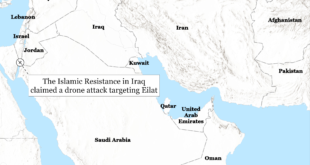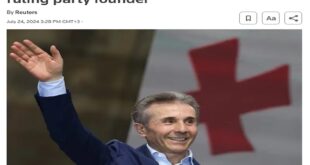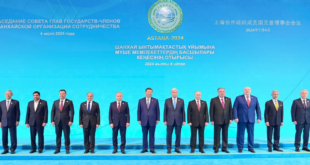In a January 28 interview with the Russian media about the Ukraine crisis, Sergey Lavrov, the Russian foreign minister, said, “if it depends on the Russian Federation, there will not be a war.” He also suggested that there were “kernels of rationality” in the formal responses to Russia’s demands that the United States and NATO had delivered a few days earlier. To some Western commentators, Lavrov’s comments were a hopeful sign that the Kremlin had achieved its intermediate aims and might be shifting course. According to this analysis, Russian President Vladimir Putin had the West exactly where he wanted it: by moving more than a hundred thousand troops to the Ukrainian border and issuing an ultimatum, he had forced the United States and NATO to enter into a dialogue with Moscow. All along, then, the Russian government had been acting with calculated brinkmanship, pursuing an approach that has left the United States and its NATO allies with few choices other than to negotiate on an equal footing.
For much of the Russian public, however, the Kremlin’s actions have looked very different. Amid widespread popular anxiety about the economy and the COVID-19 pandemic and growing fears of a large-scale war, the Russian government has seemingly raced headlong into an unnecessary and possibly reckless confrontation with the West. To Russian ears, even Lavrov’s recent conciliatory language has an unsettling ring. As the foreign minister continued, “We don’t want war, but we won’t allow anyone to trample on our interests or ignore them, either.” The words are familiar in Russia. According to the lyrics of “If Tomorrow Brings War,” a popular Soviet song from the World War II era, “We don’t want war, but we’ll defend ourselves / we’re rightfully strengthening our defense. / We’ll rout our enemy on hostile land / with little bloodshed and a mighty blow!” Shortly after the song seized the country’s imagination, the Soviet Union invaded Finland.
As with Finland in 1939, the Kremlin keeps saying it wants to avoid a conflict but seems to be doing everything it can to provoke one. There have been frequent rumors about Russian efforts to create a pretext for war, including one involving the faked video about an attack by Ukrainians on the civilian population of the Donbas that surfaced in early February. Such tactics are similar to what the Soviet leadership did when it provoked the war with Finland.
Amid weeks of analysis of Russia’s troop movements and Putin’s apparent motivations for the military buildup, there has been comparatively little attention given to what ordinary Russians think about the developments. Yet much can be learned from recent polling data. By many indications, Russians, including those who generally, if indifferently, support Putin, are deeply ambivalent about a conflict with Ukraine. Many fear severe economic consequences; given the role that Ukraine plays in Russian culture and history, some fear that a war would amount to Russia “fighting itself” (as the perestroika rock idol Boris Grebenshchikov put it in 1987). For Putin, who faces reelection in two years, these domestic anxieties are not insignificant. If Russia enters a protracted war in Ukraine, it could threaten the broad popular base on which Putin has relied for more than 20 years.
THE COMING ECONOMIC CRISIS
Outwardly, many Russians seem to support the Kremlin’s warlike stance toward the West. In the interview with Lavrov, Margarita Simonyan, the head of Russia’s RT news network, passed on the question that her social media followers had been asking: “When are we going to hit Washington?” Although Simonyan’s own hawkish views have done much to stir up such questions, the Kremlin’s basic position about defending itself from Western encroachment has often seemed to find support. As one focus-group respondent to a recent opinion survey commented, “Russia will have to respond . . . We are being pinched from all sides; they’re biting us. What are we supposed to do? Give in?”
There is also a precedent for the Kremlin’s assertive foreign policies winning popular support at home. In 2014, following the annexation of Crimea, Putin’s public approval ratings skyrocketed. For many, the Crimean Peninsula carries special significance. To the average Russian, it is a Russian imperial territory with a Russian-speaking population and a crucial military bastion in Sevastopol. Thus, the capture of Crimea was perceived by many Russians as an important consolation for the collapse of the Soviet empire, the righting of a historical injustice.
But unlike the current crisis in Ukraine, the annexation of Crimea did not involve a confrontation between two heavily armed forces. Putin retook the peninsula, like Catherine the Great had in 1783, without a single shot being fired. By contrast, any campaign to reassert Russian power in Ukraine now seems almost certainly to be both violent and protracted. And on the specific issue of an actual war, many Russians seem to be deeply apprehensive. After all, the war and stalemate in eastern Ukraine that followed the Crimean campaign in 2014 has already cost the lives of thousands of people, including an uncertain number of Russian troops and volunteer fighters. Over time, this has produced an understanding in Russia that an offensive in Ukraine will not work the way it did in Crimea. Russians know that it will be a real war, with victims. And in the face of such a conflict, they are far more ambivalent. Notably, in April 2021, during the initial buildup of Russian forces on the border with eastern Ukraine, public opinion on Russian military action was evenly split: 43 percent of respondents said that Russia should intervene, and the same number said that it should not.
Russian pessimism about the economy reflects growing fears of war.
Russian anxieties about war are even more clear in other recent polling by the Levada Center, the independent Moscow-based polling organization. In focus-group research conducted in December 2021, the center found that many Russians expressed fatigue with being in a constant state of confrontation with the West and Ukraine. The predominant attitude among participants was, “It’s frightening, unpleasant, and I don’t want to get involved.” Driving this deep unease is the sense among many Russians that Russia may soon face large-scale economic costs from the confrontation with the West. In separate December polling, Levada found that the percentage of the population that felt that an “economic crisis” in Russia was possible in the coming year had increased significantly from just one year earlier, rising from less than 50 percent to some 64 percent.
The growing economic pessimism appears to track closely with assumptions about a possible war. Notably, in the December survey, the proportion of Russians who anticipated “armed conflict with a neighboring country” in the coming year had risen by a similar amount—14 percent—going from less than a quarter of the population a year earlier to well over a third. And crucially—given the current situation in Ukraine—the number who expected a war with the United States or NATO in the coming year has nearly doubled, from 14 percent to 25 percent of the population. At the same time, there seems to be growing concerns about the prospects of a wider “world war.” In another recent Levada survey of Russians’ most common fears, the fear of a new world war ranked second only to the fear that loved ones or children will fall ill. According to the poll, a clear majority of Russians—56 percent—indicated they fear a new world war, while another 14 percent indicated they are moderately concerned about it. (Ranking a close third was “abuse of power by the authorities,” which 53 percent of Russians indicated they fear a lot and another 18 percent indicated they fear at least some of the time.)
Even without an actual war, Russian GDP and inflation forecasts for 2022 are already dismal. In recent weeks, the confrontation with the West has weakened the ruble, which had remained relatively stable in 2021, and damaged Russia’s stock markets, affecting global financial markets. Moreover, the apparent good news that real disposable income in Russia has finally begun to grow again after years of decline has been tempered by the fact that it is growing from a low starting point and only because of pent-up demand caused by the pandemic. Gloomy consumer sentiment has been augmented by concerns that new Western sanctions could leave Russia without a convertible currency or access to the SWIFT international payment system.
In general, Western sanctions have not played a deciding role in Russian attitudes about Kremlin policies, with recent polling showing that only 46 percent of Russians believe that sanctions will affect the general population, as opposed to the Kremlin elite. That could change rapidly, though, once the effects are felt. In a recent report that has also been noted in the Russian press, economists from the Washington-based Institute of International Finance conclude that a suspension of SWIFT access would “sharply limit” the ability of everyday Russians to conduct international financial transactions. The most prominent Russian macroeconomists have also made concerning forecasts. In late January, Evsey Gurvich, the head of the Economic Expert Group, an independent Moscow-based economics research organization, said that, “if sanctions are expanded, Russia’s economy will go into zero growth or a slight minus.”
“BOMBING VORONEZH”
By far the largest concern for many Russians about a war in Ukraine is the nature of the conflict. The Soviet Union fought proxy wars with the United States in Korea, the Middle East, and Vietnam, but those were distant territories involving populations with little connection to Russia. During those conflicts, Russians tended to support the wars, but few other than professional military personnel knew the true extent of Soviet involvement. The exception to this was the invasion of the Afghanistan in 1979, which greatly undermined the Soviet Union both morally and financially. In addition, Afghanistan shared a border with the Soviet Union, as Ukraine does with the Russian Federation today, and the war could not be ignored. During the Afghanistan conflict, large numbers of young Russians were sacrificed, and many families lived in constant fear of their sons being drafted into the army.
As with the war in Afghanistan, many people worry that a war in Ukraine is unlikely to be bloodless, and they fear for their boys. Ukraine is right next door. And although many Russians have family ties with Ukrainians, they do not share Putin’s view that Ukrainians and Russians are the same nation. According to a recent joint survey by Levada and the Kyiv International Institute of Sociology, the most commonly held view among Russians—representing more than 51 percent of the population—is that Russia and Ukraine should be independent but friendly states “without visas and customs.” Approximately the same proportion of Ukrainians—49 percent—hold the same opinion. By contrast, only 16 percent of Russians and six percent of Ukrainians support the idea of a unified state. Notably, two-thirds of Russians between the ages of 18 and 24—those who would be most likely to fight in Putin’s war—have a positive attitude toward Ukraine and may be very reluctant to fight at all.
Russian wars have often coincided with growing repression at home.
Until now, Putin’s foreign policies have generally seemed to buttress his popularity. Along with the annexation of Crimea, Russians have generally supported the Kremlin’s efforts to back the separatist regions of eastern Ukraine. Every military operation since the short war with Georgia in August 2008, including the Russian campaign in Syria, has either raised or sustained Putin’s and the Kremlin’s approval ratings.
But many Russians are also aware of another pattern that has very often gone together with foreign interventions, both during Soviet times and under Putin: Russian military actions have often coincided with growing repression or economic breakdown at home. When the Soviet Union entered Czechoslovakia in 1968, for example, there was a distinct political chill inside Russia. The pressure was ramped up on dissidents, and the economic reforms of then Soviet Premier Alexei Kosygin were halted. The disastrous invasion of Afghanistan, which caused an enormous drain on the Russian economy, helped precipitate the collapse of the Soviet Union. More recently, the annexation of Crimea in 2014, although popular in itself, has also led to new government pressures on civil society and a relentless crackdown on the political opposition.
Notably, it was also in the wake of the Crimea annexation that the Russian economy began to stagnate. Amid Western sanctions and a sustained slump in oil prices, the real incomes of Russians began a seven-year decline. In modern Russian, there is an expression for this kind of self-destructive behavior: “Bombing Voronezh,” with “Voronezh” a shorthand for a typical midsize Russian city. Pushing back at NATO with a war that causes more Russians to be killed and worsens the economic and political situation of ordinary Russians is a perfect example of bombing Voronezh.
THE PRICE FOR PUTIN
For now, it is unclear whether public attitudes will have any effect on the Kremlin’s actions in Ukraine. In recent years, including over the last six months of 2021, Putin’s approval ratings have largely remained unchanged. Although Putin’s ratings have little meaning in comparison with those of Western leaders, given the lack of any effective opposition in Russia, Putin continues to enjoy the approval of more than 60 percent of the population. And he seems to be convinced that first, returning Ukraine to Russia’s sphere of influence and turning it into a buffer state is an achievable goal and second, moving toward that goal can maintain and reinforce his popularity at home.
So far, he has succeeded. He has kept the world in a state of tension and uncertainty without significantly undermining his support at home. And currently, there is no organized movement in Russia against a war. But that could quickly change in the event of a military conflict. For one thing seems clear: Russians are unwilling to bear the price of a war. The Kremlin has always feared the possibility of a “color revolution” inside Russia, assuming it would come from liberal critics of the regime. But a greater threat may come from ordinary Russians who are dissatisfied with the current economic situation, including those who voted for the communists in the recent parliamentary elections of 2021. If enough Russians become convinced that a war or the prospect of a war poses a threat to their economic livelihood, support for the regime could erode.
Whether or not this reality will have any effect on the Kremlin’s thinking is far from certain. Putin may well calculate that the benefits of reasserting Russian power outweigh any political costs. But if he does, he may not only push Ukrainians further away from Russia; he may also push Russians further away from the Kremlin.
 Eurasia Press & News
Eurasia Press & News




